10 Leading Air Cargo Partners You Should Consider
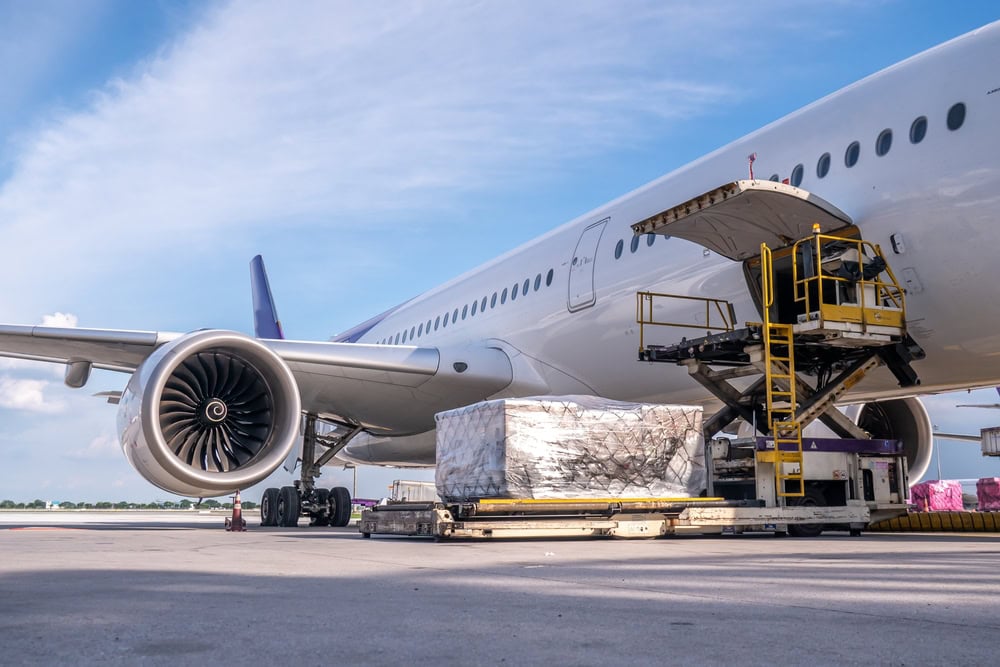
Choosing the right air cargo provider can significantly impact a company’s logistics performance and customer satisfaction. By evaluating each provider’s capabilities, services, and alignment with current trends, shippers can find the best fit for their needs in today’s fast-paced global market.
With a growing demand for faster, more resilient supply chains, air cargo has become crucial for businesses needing rapid global shipping. When selecting an air cargo provider, shippers often look for reliable, secure, and efficient partners with expertise in handling a variety of goods and navigating complex global logistics. Shippers should also consider a variety of trends and influences that shape and flex the state of air cargo shipping as well as how those shifts impact the leading air cargo carriers.
This article will examine current trends that are impacting the air cargo market, highlight the factors shippers should consider when selecting an air cargo carrier, and provide information on the leading air cargo partners you should consider for your air freight needs.
Trends Shaping Air Cargo Shipping Into 2025
The air cargo sector is evolving rapidly due to emerging technologies, consumer demand for speed, economic pressures, and the need for continuous access to various services and resources related to air cargo and logistics. Here are a few key trends:
- Adoption of Digital Tracking and AI: Digital innovations such as AI-driven demand forecasting and real-time tracking have become standard, with top carriers investing heavily in technologies to provide enhanced visibility and predictability. These tools enable shippers to manage inventory more accurately and respond faster to supply chain disruptions, giving them a competitive edge in responsiveness.
- Growth of Ecommerce: The surge in ecommerce is reshaping air cargo, with increasing demand for fast, cross-border deliveries. Carriers are expanding their services to include faster, more affordable options for ecommerce shipments, particularly in the Asia-Pacific and North American markets, where online shopping continues to grow at a rapid pace.
- Focus on Resilience and Diversification: The pandemic underscored the need for resilient supply chains. Shippers now look for providers who have diversified their routes and can offer alternative shipping options when disruptions occur. Diversifying routes and ensuring backup plans have become essential for maintaining a reliable logistics network.
The Future of Air Freight
The air freight industry is poised for significant growth, driven by the increasing demands of global trade and the booming e-commerce sector. According to the International Air Transport Association (IATA), air cargo demand is expected to grow at an annual rate of 4.2% from 2020 to 2025. This surge is largely fueled by the need for fast and reliable transportation of goods, particularly in the ecommerce space where speed is paramount.
To keep pace with this growing demand, air cargo carriers are heavily investing in cutting-edge technologies. Digitalization and automation are at the forefront, enhancing efficiency and reducing operational costs. These advancements not only streamline processes but also improve the overall quality of air freight services. Additionally, sustainability is becoming a key focus, with many carriers adopting more fuel-efficient aircraft and exploring alternative fuels to reduce their carbon footprint. This dual emphasis on technology and sustainability is shaping the future of air freight, ensuring it remains a vital component of global logistics.
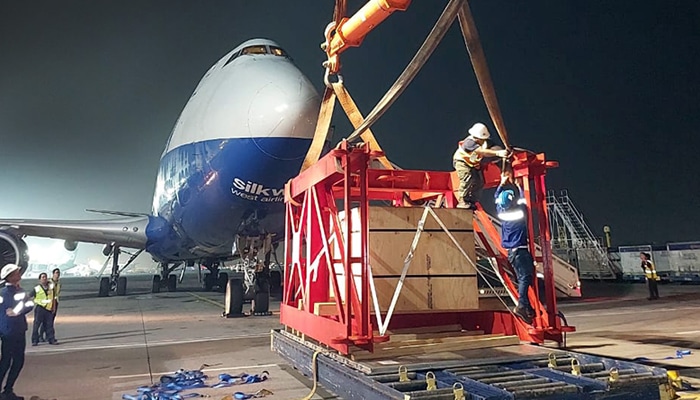
Types of Air Cargo Services
Air cargo services can be broadly categorized into two main types: general cargo and special cargo. General cargo encompasses fast-moving commercial goods (FMCG) that do not require special handling, such as electronics, clothing, and machinery. These items benefit from the speed and efficiency of air freight, ensuring timely delivery across the globe.
Special cargo, on the other hand, requires unique handling due to its nature. This category includes live animals, perishables, and oversized cargo, each demanding specific conditions and care during transport. Air cargo carriers offer a range of specialized services to cater to these needs. Express services guarantee fast and reliable transportation, ideal for time-sensitive shipments. Charter services provide customized solutions for large or unusual shipments, ensuring they reach their destination safely and efficiently. By offering these diverse services, air cargo carriers can meet the varied demands of their clients, ensuring high-quality and reliable shipments.
Cargo Airlines: Business Models
Cargo airlines operate under various business models to cater to the diverse needs of the air freight industry. Dedicated cargo airlines, such as FedEx and UPS, focus solely on cargo flights, boasting large fleets of aircraft specifically designed for freight transportation. These carriers are known for their extensive networks and ability to handle high volumes of cargo efficiently.
Passenger airlines with cargo divisions, like Lufthansa and Singapore Airlines, operate cargo flights in addition to their passenger services. These airlines often utilize the belly space of passenger aircraft to carry cargo, maximizing the use of their fleet and providing additional revenue streams. All-cargo subsidiaries of passenger airlines, such as Cathay Pacific Cargo, function as separate entities from their parent companies, concentrating exclusively on cargo transportation. These subsidiaries leverage the parent airline’s infrastructure while focusing on specialized freight services. Each business model offers unique advantages, allowing cargo airlines to meet the specific needs of their clients and maintain a competitive edge in the market.
Air Cargo Infrastructure and Capacity
Air cargo infrastructure and capacity are critical components of the air freight industry, directly impacting the efficiency and reliability of cargo shipments. Modern and efficient airports with state-of-the-art cargo handling facilities are essential for air cargo carriers. These facilities must include advanced equipment, such as automated cargo handling systems and cold chain facilities, to ensure the smooth and safe handling of various types of cargo.
To meet the growing demand for air freight, carriers are also investing in new aircraft with improved fuel efficiency and cargo capacity. Models like the Boeing 777F and Airbus A350F are becoming increasingly popular due to their ability to carry larger volumes of cargo while consuming less fuel. This investment in infrastructure and capacity ensures that air cargo carriers can provide high-quality services, maintain timely deliveries, and support the expanding needs of global trade and e-commerce.
Regulatory Environment
The air freight industry operates within a complex regulatory environment, encompassing safety, security, and customs clearance standards. Air cargo carriers must adhere to regulations set by national and international authorities, such as the International Civil Aviation Organization (ICAO) and the International Air Transport Association (IATA). These regulations ensure the safe and secure transport of goods, protecting both the cargo and the public.
Customs clearance is another critical aspect, with carriers required to comply with systems like the Automated Commercial Environment (ACE) in the United States. This involves submitting electronic customs declarations and managing duties and taxes on behalf of their customers. By adhering to these regulations, air cargo carriers can facilitate smooth and efficient international shipments, maintaining compliance and avoiding delays.
Emerging Markets and Trade Agreements
Emerging markets and trade agreements are increasingly influencing the air freight industry, opening new opportunities for growth and expansion. Countries such as China, India, and Brazil are experiencing rapid economic development, becoming significant markets for air cargo carriers. These regions offer vast potential for increased trade and air freight services, driven by their expanding consumer bases and industrial sectors.
Trade agreements like the Trans-Pacific Partnership (TPP) and the Comprehensive and Progressive Agreement for Trans-Pacific Partnership (CPTPP) are also playing a crucial role. These agreements aim to reduce trade barriers and enhance economic cooperation between member countries, fostering increased trade volumes. As a result, air cargo carriers are seeing more opportunities to expand their services and reach new markets, driving growth in the air freight industry. By capitalizing on these emerging markets and trade agreements, air cargo carriers can enhance their global presence and support the dynamic needs of international trade.
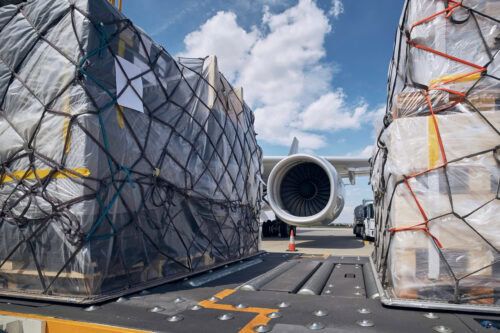
Key Considerations for Selecting an Air Cargo Provider
Choosing the right air cargo provider depends on your specific shipping needs, such as the regions you serve, the type of cargo you handle, and the level of tracking and service flexibility required. Important factors to evaluate include:
- Global Reach and Network Coverage
A provider’s reach—both in terms of geographic coverage and partnerships with other carriers—directly impacts delivery capabilities. Shippers should consider providers that have established routes to critical markets or that can easily collaborate with local or regional carriers to complete last-mile delivery. For example, carriers with hubs in major cities offer better flexibility for urgent shipments, especially in North America, Europe, and Asia. - Specialized Services for Cargo Types
Different goods require different handling. Perishable items, pharmaceuticals, and high-value electronics, for example, may need temperature-controlled shipping, real-time monitoring, or extra security. Many top carriers like Emirates SkyCargo and Lufthansa Cargo offer tailored services for specific industries, ensuring that shipments remain in optimal conditions throughout the journey. - Reliability and Punctuality
Reliability, measured through on-time performance, is critical in air cargo, where delayed shipments can lead to significant downstream effects. Shippers should investigate a provider’s track record for punctuality, especially in markets prone to weather disruptions or regulatory challenges. Cargo carriers that invest in digital tracking and proactive communication allow shippers to plan better and avoid costly delays. - Pricing and Cost Structure
While speed is a hallmark of air cargo, it often comes at a premium. Shippers should evaluate pricing options and consider providers that offer flexible rate structures, such as volume-based discounts or off-peak pricing. With the rise in fuel prices and increased regulatory fees, understanding a carrier’s pricing transparency is crucial. - Sustainability Initiatives
With the growing emphasis on sustainability in logistics, many carriers are adopting greener practices, including fuel-efficient fleets and carbon offset programs. Carriers like DHL Express and Qatar Airways Cargo, for instance, have implemented sustainability initiatives that help reduce the carbon footprint of air cargo operations. For shippers prioritizing environmental impact, partnering with a carrier that aligns with their sustainability goals is an important factor.
10 Top Air Cargo Carriers To Consider
Below are some of the top air cargo carriers in the industry, each offering unique capabilities and services for businesses looking to streamline their supply chain.
These carriers utilize a variety of aircraft, including older models still flying for cargo services, and modified passenger planes to operate as freighters.
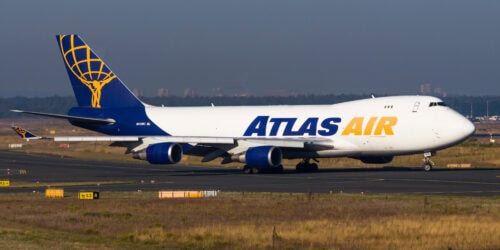
Atlas Air
Atlas Air is a leading provider of air cargo services, known for its comprehensive global network and expertise in specialized air freight solutions. As one of the largest air cargo operators, Atlas Air works with a range of industries to manage heavy, oversized, and complex shipments. Its services are ideal for companies needing large-scale or unique freight capabilities, with a focus on global reach and reliability.
- Specialties: Transporting outsized cargo, charters, ACMI (Aircraft, Crew, Maintenance, and Insurance) leasing.
- New Services: Recently expanded fleet with state-of-the-art Boeing 747-8F and Boeing 777 freighters to enhance global capacity.
- Industries Served: Aerospace, e-commerce, manufacturing, and government/defense.
- Sustainability Efforts: Initiatives to reduce carbon emissions, including fleet modernization and fuel efficiency programs.
- Fleet Size: 113 aircraft, primarily Boeing 747s and 777 freighters
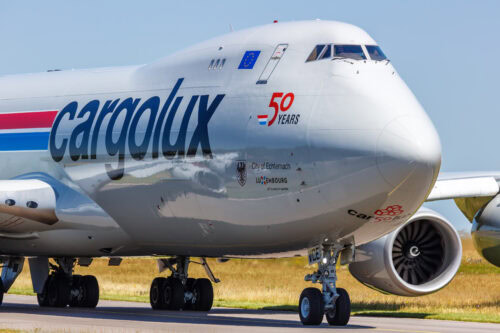
Cargolux
Cargolux is one of Europe’s leading all-cargo airlines, renowned for its expertise in handling complex and high-value shipments. With a strong global network and specialized services, Cargolux is a frequent partner for industries requiring tailored air cargo solutions. Shippers who need reliable, industry-specific solutions with a focus on quality and compliance in global air freight are on the Cargolux client roster.
- Specialties: Heavy and outsized cargo, temperature-sensitive shipments, and live animal transport.
- New Services: Recently launched specialized services for pharmaceutical logistics, including temperature-controlled solutions under strict regulatory standards.
- Industries Served: Pharmaceuticals, automotive, electronics, and aerospace.
- Sustainability Efforts: Focus on eco-friendly initiatives such as modernizing fleets with fuel-efficient Boeing 747-8F aircraft and reducing carbon emissions through operational efficiencies.
- Fleet Size: 30 Boeing 747 freighters
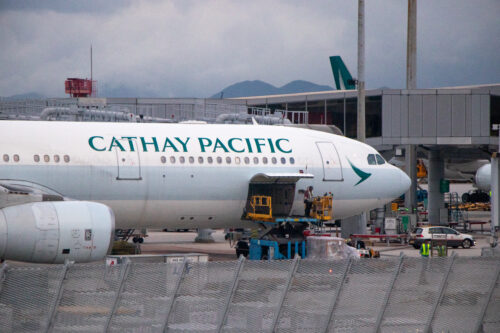
Cathay Pacific Cargo
Overview: As a dedicated air cargo provider based in Hong Kong, Cathay Pacific Cargo offers a vital link to and from the Asia-Pacific region. Known for its high standards of service, Cathay Pacific Cargo is ideal for companies looking to expand into Asian markets.
- Specialties: Temperature-sensitive handling, live animal transportation, and oversized cargo.
- New Solutions: Introduced “Ultra Track,” a real-time tracking system for high-value shipments.
- Industries Served: Fashion, pharmaceutical, technology, and perishables.
- Regional Expertise: Strong connectivity throughout Asia with robust partnerships in mainland China.
- Fleet Size: 20 aircraft, mainly Boeing 747 freighters
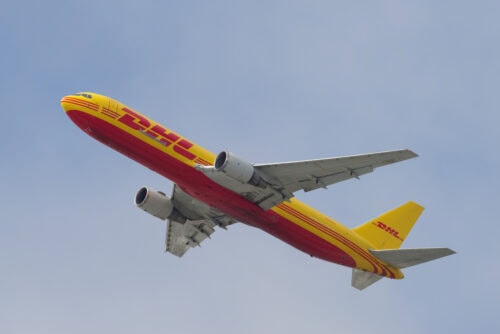
DHL Express
A global logistics powerhouse, DHL Express is one of the most well-known names in air cargo, offering services to over 220 countries. Known for its large international presence and comprehensive service offerings, DHL is a go-to partner for time-sensitive shipments.
- Specialties: International express deliveries, e-commerce fulfillment, and warehousing solutions.
- New Services: Expanding temperature-controlled logistics for pharmaceutical and healthcare products.
- Industries Served: Healthcare, automotive, technology, and retail.
- Sustainability Efforts: Pioneering green logistics initiatives with a goal of achieving zero emissions by 2050.
- Fleet Size: More than 280 aircraft
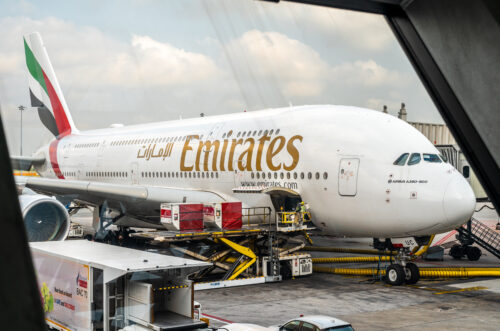
Emirates SkyCargo
Overview: Based in Dubai, Emirates SkyCargo is a leading air freight carrier with a focus on linking the Middle East to the rest of the world. Known for its luxury shipping services, it has a vast network and extensive experience in handling specialized goods.
- Specialties: Pharmaceuticals, perishables, and high-value items.
- New Solutions: “Emirates Pharma” and “Emirates Fresh” for controlled temperature shipments.
- Industries Served: Healthcare, automotive, fashion, and perishables.
- Global Coverage: Operates in over 150 destinations with a high focus on European and African markets.
- Fleet Size:11 dedicated Boeing 777 freighters
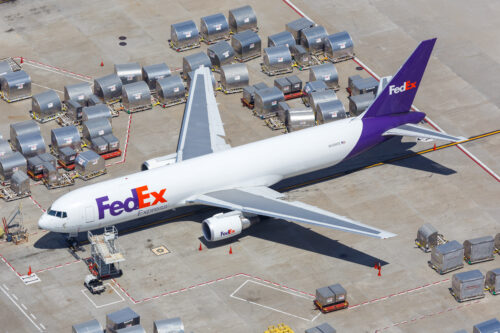
FedEx Express
FedEx Express is renowned for its extensive air cargo network, with the largest fleet of dedicated air freighters in the world. They provide a wide range of delivery speeds and shipping solutions tailored to businesses of all sizes.
- Specialties: Same-day, overnight, and international shipping; extensive network of last-mile delivery partners; customs clearance services available for international shipments.
- New Solutions: FedEx has recently focused on AI-driven forecasting tools to improve delivery accuracy and speed.
- Industries Served: E-commerce, retail, healthcare, and industrial manufacturing.
- Service Flexibility: Offers “FedEx Priority Overnight” and “International First” for ultra-time-sensitive deliveries.
- Fleet Size: 680 aircraft, ranging from small regional jets to large freighters like the Boeing 777
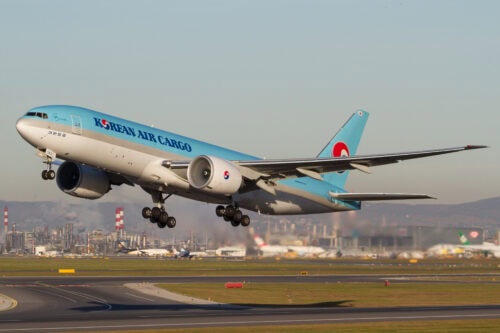
Korean Air Cargo
Overview: Korean Air Cargo is highly respected in the Asia-Pacific region, with a robust cargo division that handles everything from electronics to temperature-controlled pharmaceuticals. Known for its reliability and extensive Asian network, Korean Air Cargo is a valuable partner for companies targeting Asian markets.
- Specialties: Electronics, perishables, and pharmaceutical logistics.
- New Services: Expanding cold-chain capabilities to support more pharmaceutical clients.
- Industries Served: Electronics, healthcare, fashion, and automotive.
- Asia-Pacific Connectivity: Strong coverage across Asia with direct connections to Europe and North America.
- Fleet Size: 23 freighters, including Boeing 747 and 777 models
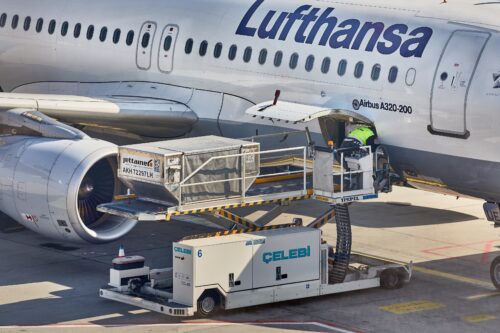
Lufthansa Cargo
Overview: Lufthansa Cargo is a European air freight leader with a commitment to precision logistics and innovation. With an extensive fleet and partnerships, Lufthansa serves industries that require careful handling and specific transport conditions.
- Specialties: Temperature-sensitive cargo, live animal transport, and hazardous goods.
- New Solutions: Launched “myAirCargo” to support smaller businesses with affordable air cargo options.
- Industries Served: Healthcare, automotive, industrial goods, and perishables.
- Innovation: Strong focus on digitalization, using AI and predictive analytics to improve service efficiency.
- Fleet Size: 10 freighters, primarily Boeing 777s
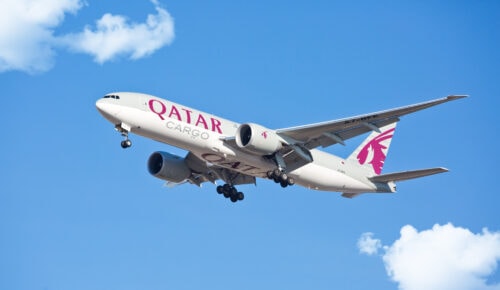
Qatar Airways Cargo
Overview: Qatar Airways Cargo is one of the fastest-growing air cargo carriers, with a reputation for delivering high-value and time-sensitive goods. Their extensive fleet and commitment to technology make them a reliable partner for many industries.
- Specialties: Live animal transport, pharmaceuticals, and general cargo.
- New Services: Recently launched “WeQare,” a sustainability initiative focused on community and environmental impact.
- Industries Served: Fashion, technology, perishables, and healthcare.
- Middle Eastern Advantage: Strategic location in Doha with global connections to Europe, Asia, and the Americas.
- Fleet Size: 30 dedicated freighters, including 777s and 747s
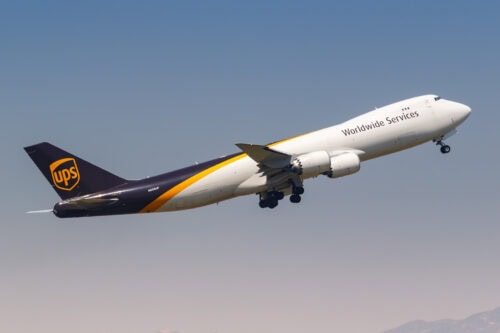
UPS Airlines
UPS Airlines is a critical player in air freight, delivering to 220 countries with a commitment to precision and dependability. UPS excels in international freight forwarding and offers specialized logistics solutions for sensitive goods.
- Specialties: Temperature-controlled shipping, especially for healthcare products, and international freight forwarding.
- New Solutions: Expanded “UPS Premier” service with tracking and priority handling for healthcare shipments.
- Industries Served: Healthcare, aerospace, technology, and e-commerce.
- Global Reach: Operates a vast hub network with major facilities in the U.S., Europe, and Asia.
- Fleet Size: More than 290 aircraft, including Boeing 747, 767, and MD-11 freighters
Finding the Right Fit
Choosing the right air cargo provider can significantly impact a company’s logistics performance and customer satisfaction. By evaluating each provider’s capabilities, services, and alignment with current trends, shippers can find the best fit for their needs in today’s fast-paced global market. Knowing the leading air cargo carriers to choose from is the first step.
